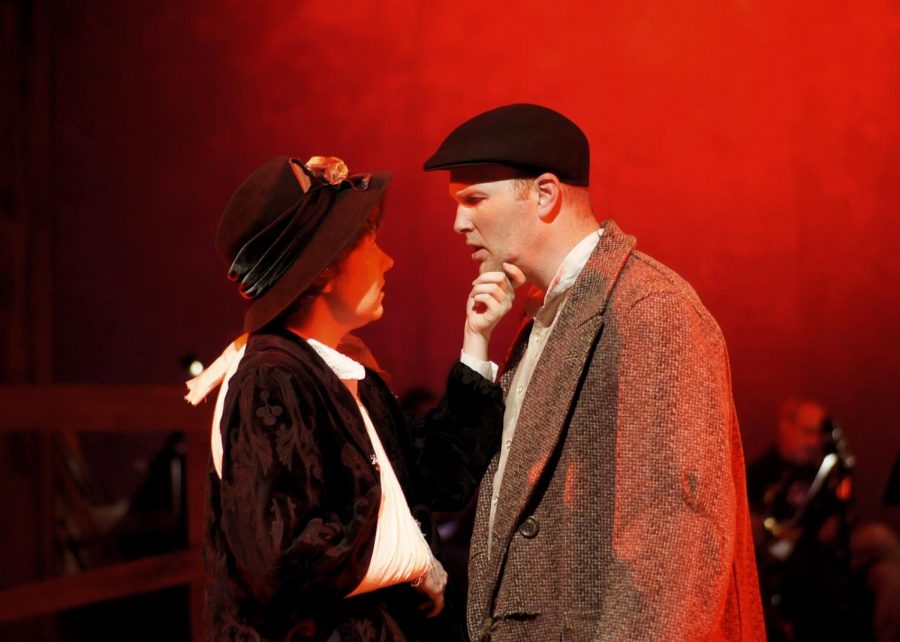Assassins sneak on to the Iowa City Community theater stage
The play explores the delusion of violence being the answer to pain and suffering.
September 23, 2018
Stephen Sondheim’s 1990 musical, Assassins, was guns blazing in the Iowa City Community theater as viewers witnessed a retelling of some of America’s darkest moments; this time told from the perspective of those we look back at with intense animosity.
Nine people known for successfully and unsuccessfully assassinating American presidents gathered on a dim and hazy stage coated with red, white, and blue panels, and American flags torn, hanging off the stage’s balcony.
A giddy proprietor, played by Josh Sazon, met with each of the nine assassins in hope of selling them their weapon of use. The nine assassins were led by John Wilkes Booth, played by Kehry Anson Lane, who first demonstrated to viewers the dark, yet humanistic tone of the musical with the assassins being presented first and foremost as people, not villains from history textbooks.
Booth stood in the center of the stage, angry with the current state of the confederacy, and as expected, fired his derringer into the center of the crowd. Out of nowhere, a man from the crowd hopped out of his seat and on stage, acting as the musical’s balladeer.
His voice roared throughout the room, speaking to Booth about his action of killing President Lincoln. He acted as the story’s moral compass, helping each of the assassins psychoanalyze their selfish and hopeless decisions.
Each assassin painted themselves in a light that turned them into multidimensional characters rather than simple villains.
The Polish-American Leon Czolgosz, known for assassinating President William McKinley, struggled in life finding a sense of belonging, as he aimlessly traveled from town to town hoping a sense of purpose would appear. In the musical he falls in love with a political radical, Emma Goldman, whose views on the current state of affairs were something he related with.
With these assassins presented in a complex manner, it forces viewers to look back at history with more of an open mind, to empathize with this ensemble of villains whose lives were so depressing, that their only hope of purpose in the world was to rid all of their pain with violence, or as many of the assassins say in their delusion, “Well, you could kill the president.”
The story itself is of dark subject matter, with each of the assassins constantly whipping out their guns, aiming them into the crowd. That being said, at times the dark tones were subtler, which empowered the story’s themes even more.
The most notable example of this was Samuel Byck sitting in a chair, disgruntled in a Santa Claus outfit, talking into a tape recorder he hopes to send to American composer Leonard Bernstein, addressing his song from West Side Story, “Tonight.”
As Samuel Byck, Jeffery Allen Mead delivers a powerful monologue where he tells Bernstein he longs for a romantic night like his song captures. Suffering from isolation like the other assassins, Byck talks his problems through to Bernstein, how he longs for someone to trust, someone to look at him and notice his presence.
Byck’s tone darkens, as he angrily comes to terms with his depression and verbally attacks Bernstein, wondering how difficult it would be for Bernstein to give him a call to cheer him up; reminding viewers the power of inclusivity and how much a simple conversation can affect someone’s mental state.
After questioning even life itself, Byck ends his monologue, like the remaining eight assassins, by concluding that violence is the best answer for pain and to cure the loneliness, killing the president will forever keep him and the rest of the assassins alive in history.
Though unfortunately for Booth, Lee Harvey Oswald, and the remaining seven, they lose their complexity and sense of humanity as the history textbook flips its page.




